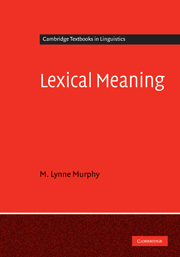Preface: using this book
Published online by Cambridge University Press: 05 June 2012
Summary
Lexical semantics is approached by students of linguistics at various points in their undergraduate and graduate curricula, and this book is intended to suit anyone who has had some introduction to linguistics, but who has not yet studied lexical semantics in any depth. Given such a broad audience, it is inevitable that at some points in the text some readers will consider the material difficult and others will consider it a bit basic. My aim is to present problems of word meaning in all their messy glory – showing where there are interesting problems to be solved and considering multiple viewpoints on those problems. The big questions of how meanings work have been pondered for centuries, but the answers remain elusive, since how these questions can be answered depends upon the background assumptions about the nature of language, meaning, and mind that different approaches bring to them. In order to limit the range of background assumptions, this book is biased toward componential theories that are compatible with generative approaches to grammar. For readers who already have some general knowledge about linguistic theories, this book demonstrates how those approaches tackle issues of word meaning. Readers for whom these theories are not yet familiar will discover how their perspectives vary when it comes to the lexicon and meaning. If this leaves you wanting more information about the theories generally, the “Further reading” section near the end of each chapter plots out a proposed course of reading to broaden and deepen your knowledge of these subjects.
Adopt-a-word
Two types of exercise are provided at the end of each chapter. The general exercises provide problems to think about and new data with which to practice the concepts introduced in the chapter. In addition to these, each chapter has some “Adopt-a-word” assignments. These assignments allow you to explore the concepts introduced in the text through the perspective of a single word. We will cover a variety of topics and theoretical perspectives in a limited number of pages, but if you specialize in a particular word, you will be able to explore those topics in some depth and build on the knowledge you gain from chapter to chapter, rather than just flitting from one topic to the next. While you may cover a lot of linguistic ground, you will follow a coherent theme – the study of a particular word.
- Type
- Chapter
- Information
- Lexical Meaning , pp. xiii - xvPublisher: Cambridge University PressPrint publication year: 2010

